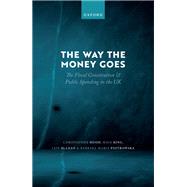The Way the Money Goes The Fiscal Constitution and Public Spending in the UK
, by Hood, Christopher; King, Maia; McLean, Iain; Piotrowska, Barbara Maria- ISBN: 9780198865087 | 0198865082
- Cover: Hardcover
- Copyright: 3/21/2024
The Way the Money Goes traces out what happened to the UK's fiscal constitution - the framework for planning and controlling public spending - under three different governments (Conservative, Labour, Conservative/Liberal Democrat) from the early 1990s to the mid-2010s. The book tells the story of what happened under each government and combines narrative with vignettes that range from the funding of a new Treasury building to efforts to 'crowdsource' ideas for spending cuts. It also includes chapters devoted to different domains of spending control, namely capital spending, spending by subnational governments, running cost expenditure, fiscal forecasting, and the development of new accounting metrics.
This book is based on over 120 in-depth interviews of civil servants and ministers who were involved in public spending over the period, as well as documents from the same timeframe. It explores how and why, despite much talk of change and reform in everything from parliamentary procedure to bureaucratic processes, many of the underlying features of the UK's fiscal constitution persisted, including arrangements for formula-funding of the different countries within the union designed as a temporary stopgap in the transition to devolution. To put UK developments into perspective, the book includes a discussion of how the UK system was rated in reports from international bodies over the period, which suggests that in such exercises the more 'political' parts of the fiscal constitution were rated differently from the more 'technocratic' parts. Given several volcanic-type political eruptions in the UK over recent years, the book concludes by exploring some different possible scenarios for the future of its fiscal constitution in the light of those and other possible eruptions to come.
This book is based on over 120 in-depth interviews of civil servants and ministers who were involved in public spending over the period, as well as documents from the same timeframe. It explores how and why, despite much talk of change and reform in everything from parliamentary procedure to bureaucratic processes, many of the underlying features of the UK's fiscal constitution persisted, including arrangements for formula-funding of the different countries within the union designed as a temporary stopgap in the transition to devolution. To put UK developments into perspective, the book includes a discussion of how the UK system was rated in reports from international bodies over the period, which suggests that in such exercises the more 'political' parts of the fiscal constitution were rated differently from the more 'technocratic' parts. Given several volcanic-type political eruptions in the UK over recent years, the book concludes by exploring some different possible scenarios for the future of its fiscal constitution in the light of those and other possible eruptions to come.







